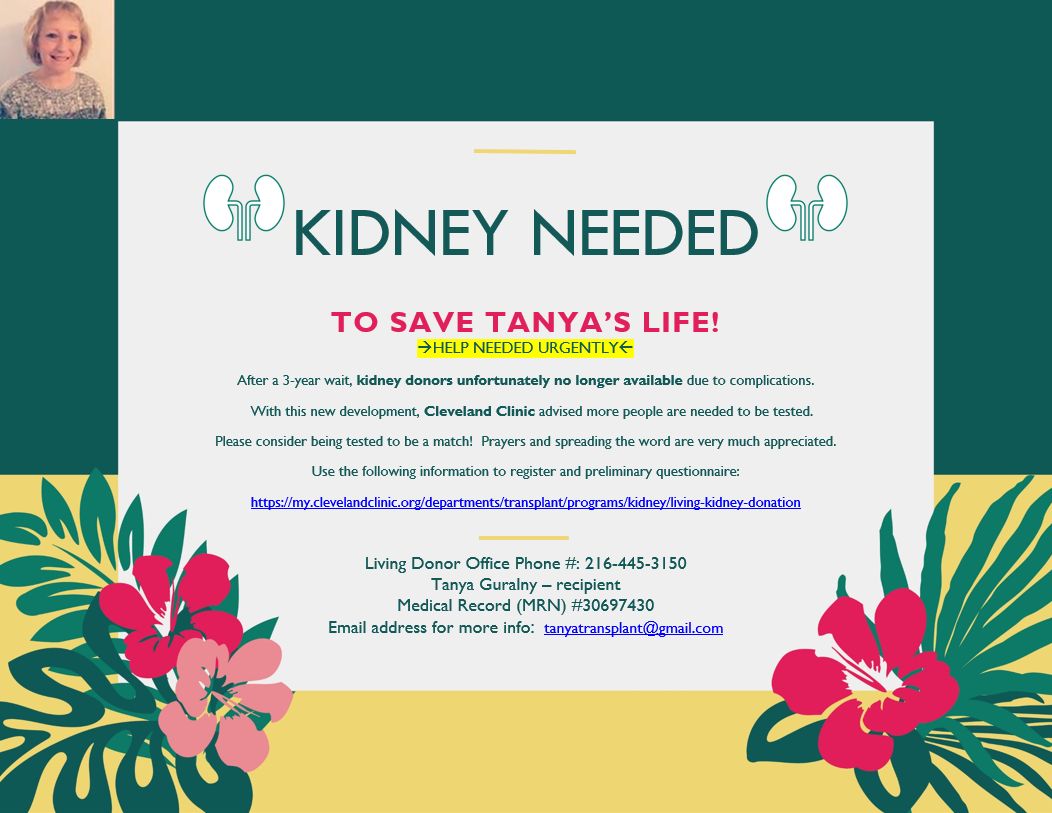TONAWANDA, N.Y. — Taking care of herself is the reason Tanya Guralny, a Town of Tonawanda resident and Rich Products employee, has maintained a healthy cadaver kidney transplant for nearly 20 years. She has lasted longer than the 15-year expectancy rate given to her by her doctors. However, that kidney is failing now, and it’s taking a toll on her, despite everything she does to stay well.
“The more the disease progresses, you just don’t have the energy you used to have,” Guralny said. “And I’m used to being very active and that’s a change. I can’t wait to get back to my old self again.”
Guralny was diagnosed with renal disease after years of suffering from Type 1 diabetes, which she was diagnosed with at 11 years old. This led to more health challenges, including hypertension.
“I managed that for about 10 years before the kidneys just started to fail,” she said. “And it was time to think transplant and think dialysis.”
As Guralny explained, the kidney works to filter toxins out of your body, but when it is unable to do so due to failure, dialysis works as an artificial filter to do the work of the organ. The process of undergoing dialysis is a stressful experience itself, however, as it causes pain and exhaustion, both mentally and physically.
“One needle draws out the blood, puts it through a machine to wash it, clean it, and then the other needle puts it back in my body," she said. "Imagine sitting on a machine for four hours, with two needles in your arm pulling out your blood, processing it through a machine, putting it back into your body to clean it for you because your kidney can’t do it anymore.”
In 2002, Guralny began working with the Cleveland Center to receive two transplants, her cadaver kidney and a pancreas. The latter, she says, cured her of diabetes.
In the search for a kidney from a living donor, which can last two to three times longer than a cadaver, Guralny has come close seven times over the past three years, the most recent being last Wednesday. For one reason or another, she hasn’t been able to find her perfect match. One instance in 2019 involved a relative who unfortunately became disqualified after a discovery during his examination.
“My nephew Peter was a match for me; we did not know this, but he was born with one kidney," Guralny said. "He was a good match, but when he went for his physical in Cleveland, they discovered he had one kidney, not two.”
Despite not yet receiving the donation she needs, Guralny considers everyone who even got tested as a potential match to be her kidney heroes. In an act of heroism herself, she’s sharing her story not just to find a match for herself, but for over 100,000 other people who are in need of a life-saving transplant.

“There’s more than just me out there waiting for a living donor," Guralny said. "So if this can help other people as well, that’s my goal. I want to make sure that others are taken care of as well as myself."
Donor health is just as important as those in search for a vital organ. Those considered as potential donors should be mindful to drink plenty of water, maintain a healthy body weight, and avoid cigarettes and alcohol.
Most donor matches can take three to five years. Having already been on the waiting list since 2018, time is of the essence for Guralny. If her future kidney hero is watching right now, she has a few things she’d like to say.
“Thank you for saving my life," she said. "I can’t tell you how much I appreciate the gift you just gave me. That’s what I would say, and hopefully, we could be friends for the rest of our lives.”



